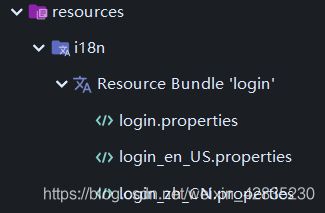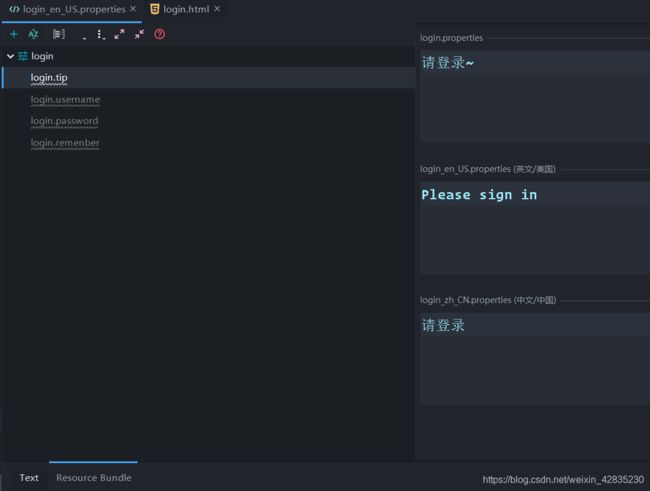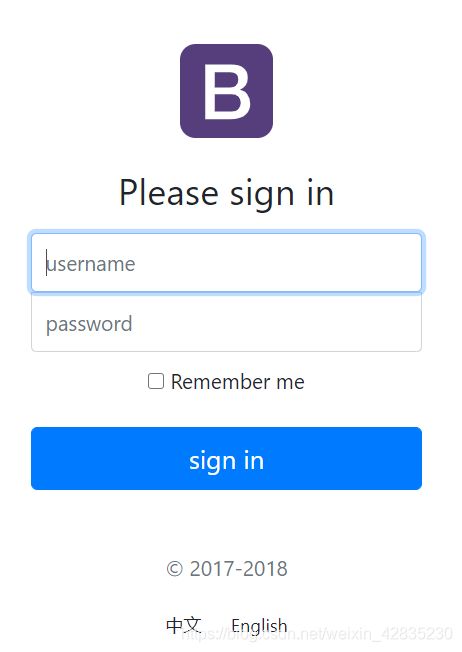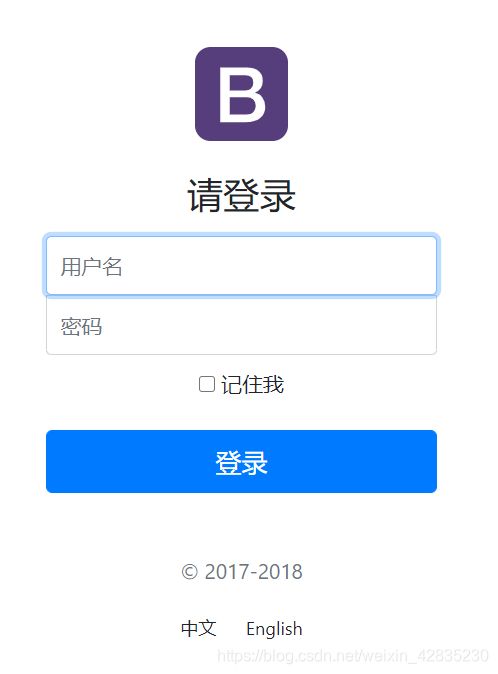15 | SpringBoot + thymeleaf 的登陆页面如何实现国际化
1、编写国际化配置文件,抽取页面需要显示的国际化消息
(1)在resources文件夹下创建i18n文件夹,用来存放国际化配置文件,为什么是i18n???
i18n(其来源是英文单词 internationalization的首末字符i和n,18为中间的字符数)是“国际化”的简称。

然后任意打开一个配置文件,如login_en_US.properties,点击Resources Bundle,输入你想要国际化的属性

(2)在全局配置文件中绑定这些自定义的国际化配置
SpringBoot自动配置好了管理国际化资源文件的组件
@ConfigurationProperties(prefix = "spring.messages")
public class MessageSourceAutoConfiguration {
/**
* Comma-separated list of basenames (essentially a fully-qualified classpath
* location), each following the ResourceBundle convention with relaxed support for
* slash based locations. If it doesn't contain a package qualifier (such as
* "org.mypackage"), it will be resolved from the classpath root.
*/
private String basename = "messages";
//我们的配置文件可以直接放在类路径下叫messages.properties;
@Bean
public MessageSource messageSource() {
ResourceBundleMessageSource messageSource = new ResourceBundleMessageSource();
if (StringUtils.hasText(this.basename)) {
//设置国际化资源文件的基础名(去掉语言国家代码的)
messageSource.setBasenames(StringUtils.commaDelimitedListToStringArray(
StringUtils.trimAllWhitespace(this.basename)));
}
if (this.encoding != null) {
messageSource.setDefaultEncoding(this.encoding.name());
}
messageSource.setFallbackToSystemLocale(this.fallbackToSystemLocale);
messageSource.setCacheSeconds(this.cacheSeconds);
messageSource.setAlwaysUseMessageFormat(this.alwaysUseMessageFormat);
return messageSource;
}
我们的配置文件可以直接放在类路径下叫messages.properties 不用做任何配置就可使用国际化,但我们这里创建了一个i18n文件夹,所以我们要在全局配置文件中通过spring.messages.messages绑定资源文件的基础名(去掉语言国家代码的)
application.properties
spring.messages.basename=i18n.login
2、修改login.html
https://www.webjars.org/
公共资源用webjars提供的东西,自己的资源就用assets文件夹里的
<dependency>
<groupId>org.webjarsgroupId>
<artifactId>bootstrapartifactId>
<version>4.5.0version>
dependency>
login.html
<html lang="en" xmlns:th="http://www.thymeleaf.org">
<head>
<meta http-equiv="Content-Type" content="text/html; charset=UTF-8">
<meta name="viewport" content="width=device-width, initial-scale=1, shrink-to-fit=no">
<meta name="description" content="">
<meta name="author" content="">
<title>Signin Template for Bootstraptitle>
<link href="asserts/css/bootstrap.min.css" th:href="@{/webjars/bootstrap/4.5.0/css/bootstrap.css}" rel="stylesheet">
<link href="asserts/css/signin.css" th:href="@{/asserts/css/signin.css}" rel="stylesheet">
head>
<body class="text-center">
<form class="form-signin" action="dashboard.html">
<img class="mb-4" th:src="@{/asserts/img/bootstrap-solid.svg}" src="asserts/img/bootstrap-solid.svg" alt="" width="72" height="72">
<h1 class="h3 mb-3 font-weight-normal" th:text="#{login.tip}">Please sign inh1>
<label class="sr-only" th:text="#{login.username}">Usernamelabel>
<input type="text" class="form-control" placeholder="Username" th:placeholder="#{login.username}" required="" autofocus="">
<label class="sr-only" th:text="#{login.password}">Passwordlabel>
<input type="password" class="form-control" placeholder="Password" th:placeholder="#{login.password}" required="">
<div class="checkbox mb-3">
<label>
<input type="checkbox" value="remember-me"/> [[#{login.remember}]]
label>
div>
<button class="btn btn-lg btn-primary btn-block" type="submit" th:text="#{login.btn}">Sign inbutton>
<p class="mt-5 mb-3 text-muted">© 2017-2018p>
<a class="btn btn-sm" th:href="@{/index.html(l='zh_CN')}">中文a>
<a class="btn btn-sm" th:href="@{/index.html(l='en_US')}">Englisha>
form>
body>
html>
3、编写MyLocaleResolver实现LocaleResolver接口
(1)创建MyLocaleResolver类
//可以在连接上携带区域信息
public class MyLocaleResolver implements LocaleResolver {
@Override
public Locale resolveLocale(HttpServletRequest httpServletRequest) {
String l = httpServletRequest.getParameter("l");
// 如果没有 l 返回请求头的默认值
Locale locale = Locale.getDefault();
if(!StringUtils.isEmpty(l)){
String[] split = l.split("_");
locale = new Locale(split[0],split[1]);
}
return locale;
}
@Override
public void setLocale(HttpServletRequest httpServletRequest, HttpServletResponse httpServletResponse, Locale locale) {
}
}
为什么要实现LocaleResolver接口呢??
国际化Locale(区域信息对象);LocaleResolver(获取区域信息对象);
@Bean
@ConditionalOnMissingBean
@ConditionalOnProperty(prefix = "spring.mvc", name = "locale")
public LocaleResolver localeResolver() {
if (this.mvcProperties
.getLocaleResolver() == WebMvcProperties.LocaleResolver.FIXED) {
return new FixedLocaleResolver(this.mvcProperties.getLocale());
}
AcceptHeaderLocaleResolver localeResolver = new AcceptHeaderLocaleResolver();
localeResolver.setDefaultLocale(this.mvcProperties.getLocale());
return localeResolver;
}
默认的就是根据请求头带来的区域信息获取Locale进行国际化
(2)在配置类中注册这个Bean
//使用WebMvcConfigurer可以来扩展SpringMVC的功能
//@EnableWebMvc 不要接管SpringMVC
@Configuration
public class MyMvcConfig implements WebMvcConfigurer {
//所有的WebMvcConfigurer组件都会一起起作用
@Bean //将组件注册在容器
public WebMvcConfigurer webMvcConfigurer(){
WebMvcConfigurer webMvcConfigurer = new WebMvcConfigurer() {
@Override
public void addViewControllers(ViewControllerRegistry registry) {
registry.addViewController("/").setViewName("login");
registry.addViewController("/index.html").setViewName("login");
}
};
return webMvcConfigurer;
}
@Bean
public LocaleResolver localeResolver(){
return new MyLocaleResolver();
}
}

